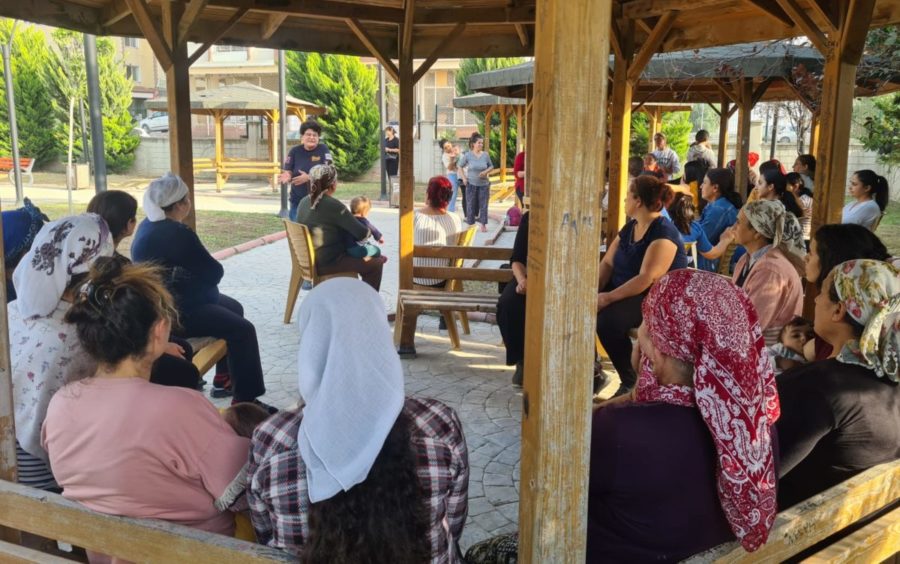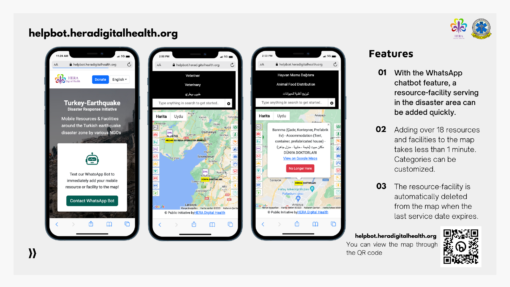
The Medical Search and Rescue Association (Medikal Arama Kurtarma Derneği – MEDAK) is working to improve access to healthcare in earthquake-affected regions, with a focus on sexual and reproductive health. Supported by our Regional Recovery Support Program, launched under the Kahramanmaraş Earthquake Emergency Relief Fund, MEDAK conducted outreach activities reaching thousands of women to raise awareness.
Please read the following interview with the organisation for an insight into their work.
What led you to undertake a project focused on sexual and reproductive health? How did this issue arise during your disaster response efforts?
Several important factors led us to focus on sexual and reproductive health (SRH):
- The February 6 Kahramanmaraş earthquakes severely disrupted healthcare services, damaging infrastructure and affecting both emergency and SRH services.
- After disasters, women, children, and vulnerable groups often face significant difficulties accessing SRH services. This includes safe childbirth, access to contraceptives, and prevention of sexually transmitted infections.
We prioritised SRH based on the Minimum Initial Service Package (MISP) principles to restore health services, protect vulnerable groups, and improve community well-being.
After the earthquakes, accessing healthcare became a major issue due to damaged health stations, lack of clean water, hygiene materials, and safe shelter. These challenges posed serious health risks, especially for women and children. To address this, we monitored and reported on SRH issues, updating our HERA Digital Health Mobile app with the locations of temporary healthcare stations and publishing these maps on www.afetsaglikharitasi.org.
We visited health institutions and temporary healthcare stations to monitor SRH services and shared our findings in a report. Our HERA app, initially developed for displaced communities, became a vital tool for survivors, incorporating SRH and gender-based violence (GBV) content, vaccination tracking, nearby healthcare institutions, and pregnancy monitoring. We also held informational sessions for women to ensure access to crucial information.
You are implementing the “Supporting Sexual and Reproductive Health in Disasters” project with our grant support. Can you tell us about the project’s outcomes and impact on the field?
With this grant support, we:
- Updated and improved the HERA app and integrated an AI-supported WhatsApp chatbot system.
- Released two reports examining the current SRH and GBV situation.
- Conducted SRH, GBV, and HERA app informational sessions for 2,188 women in Hatay from June 2023 to June 2024.
- Distributed 57,729 hygiene materials, reaching 78,507 people.
Since the Kahramanmaraş earthquakes, we have reached 3,160 women in 73 neighbourhoods in Hatay and Adana, distributed 95,549 hygiene materials, and impacted 133,487 people.

How did you overcome the challenges faced on the ground? What do you think is necessary to achieve a lasting impact in this area?
We faced several, including difficult working conditions due to dust from the destruction, clean water shortages, and resource shortages, particularly in condoms and hygiene kits. We overcame these by establishing partnerships, communicating directly with the local community, and receiving support from community leaders and volunteers.
To achieve a lasting impact, we suggest:
- Sustainable Education Programs: Continuous programs to raise SRH awareness SRH before, during, and after disasters.
- Community-Based Healthcare Services: Strengthening local services to ensure continuity during disasters.
- Digital Health Solutions: Promoting digital health solutions like the HERA app to increase access to information.
- Policy and Support Mechanisms: Collaborating with public and international organisations to establish necessary policies and support mechanisms.
What are MEDAK’s future goals? How has the project conducted with our grant support influenced your future goals?
We aim to increase healthcare access for migrants, refugees, and disaster-affected communities using digital health technologies. This includes ensuring digital portability of health records, helping users navigate health systems more effectively, and raising awareness.
The project supported by Turkey Mozaik Foundation and the Support Foundation for Civil Society has significantly contributed to these goals, reducing barriers to healthcare access, especially for refugees. The HERA app, for example, allows individuals to securely access health records and track children’s vaccination schedules.
Our future projects aim to expand the reach of these technologies, using AI and machine learning more effectively to improve health service quality. Our AI-based WhatsApp chatbot provides users with immediate answers to health-related questions, ensuring accurate information during health emergencies.
The financial support and mentorship from Turkey Mozaik Foundation and the Support Foundation for Civil Society are crucial for our efforts’ sustainability and the development of new technologies. We aim to continue these collaborations, reach larger audiences, and further improve healthcare access.
Do you have a message to share with our donors and supporters?
We extend our gratitude to all donors supporting the fund. Your support has been critical in increasing healthcare access through digital health technologies during disasters, preventing high-risk pregnancies, improving child vaccination rates, and combating GBV.
Thanks to your contributions, we can make healthcare services more accessible and effective, especially for refugee women and children and those affected by earthquakes. Your support is crucial for the sustainability and expansion of our efforts. We hope to continue our partnerships in the future.
By supporting women’s access to healthcare services in disasters, spreading accurate information, and protecting the right to health, we will continue to work tirelessly to improve the lives of those affected by earthquakes. Thank you.



